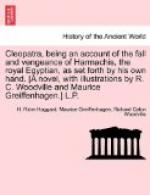“Awake!” she cried. “Awake! This is no time for sleep! Seleucus hath surrendered Pelusium to Caesar, who marches straight on Alexandria!”
With a great oath, Antony sprang up and clutched Cleopatra by the arm.
“Thou hast betrayed me—by the Gods I swear it! Now thou shalt pay the price!” And snatching up his sword he drew it.
“Stay thy hand, Antony!” she cried. “It is false—I know naught of this!” And she sprang upon him, and clung about his neck, weeping. “I know naught, my Lord. Take thou the wife of Seleucus and his little children, whom I hold in guard, and avenge thyself. O Antony, Antony! why dost thou doubt me?”
Then Antony threw down his sword upon the marble, and, casting himself upon the couch, hid his face, and groaned in bitterness of spirit.
But Charmion smiled, for it was she who had sent secretly to Seleucus, her friend, counselling him to surrender forthwith, saying that no fight would be made at Alexandria. And that very night Cleopatra took all her great store of pearls and emeralds—those that remained of the treasure of Menkau-ra—all her wealth of gold, ebony, ivory, and cinnamon, treasure without price, and placed it in the mausoleum of granite which, after our Egyptian fashion, she had built upon the hill that is by the Temple of the Holy Isis. These riches she piled up upon a bed of flax, that, when she fired it, all might perish in the flame and escape the greed of money-loving Octavianus. And she slept henceforth in this tomb, away from Antony; but in the daytime she still saw him at the palace.
But a little while after, when Caesar with all his great force had already crossed the Caponic mouth of the Nile and was hard on Alexandria, I came to the palace, whither Cleopatra had summoned me. There I found her in the Alabaster Hall, royally clad, a wild light in her eyes, and, with her, Iras and Charmion, and before her guards; and stretched here and there upon the marble, bodies of dead men, among whom lay one yet dying.
“Greeting, thou Olympus!” she cried. “Here is a sight to glad a physician’s heart—men dead and men sick unto death!”
“What doest thou, O Queen?” I said affrighted.
“What do I? I wreak justice on these criminals and traitors; and, Olympus, I learn the ways of death. I have caused six different poisons to be given to these slaves, and with an attentive eye have watched their working. That man,” and she pointed to a Nubian, “he went mad, and raved of his native deserts and his mother. He thought himself a child again, poor fool! and bade her hold him close to her breast and save him from the darkness which drew near. And that Greek, he shrieked, and, shrieking, died. And this, he wept and prayed for pity, and in the end, like a coward, breathed his last. Now, note the Egyptian yonder, he who still lives and groans; first he took the draught—the deadliest draught of all, they swore—and yet the slave so dearly loves his life he will not leave it! See, he yet strives to throw the poison from him; twice have I given him the cup and yet he is athirst. What a drunkard we have here! Man, man, knowest thou not that in death only can peace be found? Struggle no more, but enter into rest.” And even as she spoke, the man, with a great cry, gave up the spirit.




